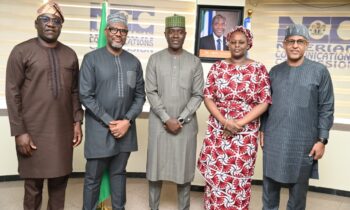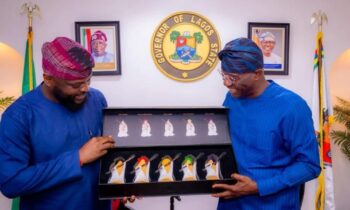
The Nigerian Communications Commission, NCC’s commitment and resolve to align with World Bank expectations to promote key regulatory policies that will position Nigeria to take significant economic leap using the Digital Economy platform
In its ‘NIGERIA Digital Economy Diagnostic Report,’ the World Bank unambiguously states that Nigeria is uniquely positioned to reap the benefits of the digital economy.
It says that Nigeria accounts for 47 per cent of West Africa’s population, and half of the country’s 200 million people are under the age of 30.
Nigeria has the largest mobile market in Sub-Saharan Africa, supported by strong mobile broadband infrastructure and improved international connectivity; yet minimal fixed broadband infrastructure and connectivity in rural areas is leaving a significant number of the most marginalized segments of the population without Internet access.
By the Bank’s assessment Nigeria is home to several high-growth digital companies that provide hopeful examples of the country’s digital potential. Lagos is a mature and active ecosystem with dynamic incubators, venture capital companies, digital start-ups, and private services via digital platforms. And the potential of digital Financial services remains untapped despite the large share of unbanked population.
To deliver on the 2030 aspirations of greater access to the digital economy and meet the bold objective of creating 100 million jobs in Nigeria, the country needs to increase investment in infrastructure, create an enabling regulatory environment for the digital economy to grow (e.g., regulatory enablers of DFS), pursue radical reforms that bring about improved skills and a more competitive digital job market, support public-private partnerships to stimulate and sustain demand for the use of digital plat- forms, and improve the current business climate to boost more investment opportunities.
In an opening note of the report, signed by Shubham Chaudhuri , Country Director, Nigeria World Bank Group, the World Bank Group confirms standing ready to support Nigeria in pursuing context-specific approaches that will prioritize key interventions in the five foundational elements and advance the digital economy in Nigeria to promote rapid growth, more and better jobs, and more accessible and higher quality public and private services.
Creating Digital Economy Department To Support NDEPS
The Nigerian Communications Commission, NCC, is information driven agency that that researches on opportunities inherent in the technology driven world.
The World Bank analysis and forecasts is seen as a challenge and the agency takes on every piece of information to create wealth of opportunities.
Given its understanding of potentials of Digital Economy, the Commission in continuation of its renewed strategy and vigour for effective delivery of its regulatory mandate, in July 2020, created a Digital Economy Department, principally responsible for implementing programmes and policies aimed at fully supporting and promoting the national digital economy agenda of the Federal Government.
An astute and ingenious head of the agency, Prof. Garba Umar Danbatta, has the belief and conviction that the unit will go further in delivering some key results.
The creation of the new department clearly was in line with the Commission’s strategy to create a dedicated team, with the sole responsibility of giving necessary push to the promotion of digital economy vision of the Federal Government. According to Prof. Danbatta, “placing the newly-created department under the Office of the EVC also underscores the importance the Commission places on the need to successfully drive the overall national digital economy strategy of the government through ensuring its effective monitoring and supervision.” In addition to working with the eight pillars of the National Economy Policy and Strategy (NDEPS) document, the Broadband Implementation Unit in the Commission, hitherto placed under the Special Duties Department and all the staff of the Unit, are to move to the newly-created Digital Economy Department.
Already, Babagana Digima, an Assistant Director in the Special Duties Department has been moved and designated as the pioneer Head of the new department. The NDEPS, as a national policy document, was unveiled by President Muhammadu Buhari in November 2019 to add the needed impetus to the actualisation of the Federal Government’s Economy Recovery and Growth Plan (ERGP).
In line with its inter-agency collaboration, the Nigerian Communications Commission (NCC) has signed a Memorandum of Understanding (MoU) with the Federal Inland Revenue Service (FIRS) in May, 2020, to ensure the tax agency ascertain accuracy and completeness of value added tax (VAT) elements and other taxes payable in the transactions of telecoms operators.
With the MoU, the FIRS will be able to integrate an application programming interface (API) technology solution with the systems of telecom Operators for independent verification of the amount of VAT that should be paid by mobile network operators (MNO) rather than relying entirely on the Operators’ books of accounts. The MoU with FIRS joined a long list of other orgainsations both in the public and private sectors which the NCC has collaborated with towards ensuring regulatory excellence, since telecoms percolates all the spheres of our society.
The Minister of Communication and Digital Economy, Dr Isa Pantami, has projected that Nigeria’s economy would go 21 per cent digital by 2021, as digitalisation is becoming the most adopted economy globally.
Pantami, has always seen the NCC as engine that will drive the growth.
According to him, the advent of the COVID-19 pandemic brought to light the importance of the digital economy in the growth of any nation, noting that it also underscored the need to fast track digital transformation in Nigeria.
Speaking at the Chartered Institute of Bankers of Nigeria’s (CIBN) 2020 Graduates’ Induction and Prize Award’s Day, held virtually, Pantami said the digital economy drive is focused on four key areas – digital identification, broadband penetration, smartphones, and bank accounts.
The Minister of Communication and Digital Economy, Dr Isa Pantami, has projected that Nigeria’s economy would go 21 per cent digital by 2021, as digitalisation is becoming the most adopted economy globally.
his is even as broadband penetration at the end of July rose to over 43 per cent, almost 10 per cent increase in less than a year, compared to the usual two per cent penetration witnessed in the years before.
He said the Ministry was working to ensure that indigenous digital solution providers and entrepreneurs get preference, as the current administration is committed to consuming what it produces.
“The latest Quarter Two (Q2) 2020 report recently released by the National Bureau of Statistics (NBS), showed that the Information and Communications Technology (ICT) sector contributed about to 17.83 per cent to the Gross Domestic Product (GDP), from 13.85 per cent in the same period of 2019.
“Yet, the digital economy was not included in the disclosed figure. If the digital economy was added, it would have risen well above 45 per cent to GDP,” Pantami added.
Earlier, President and Chairman of Council, CIBN, Bayo Olugbemi, in his speech, the future of the banking industry.
He said it was in recognition of the important role the banking and finance industry plays in the growth and development of the economy that the Institute decided to x-ray the topic, “Digital Economy: The Role of Professional Bankers





